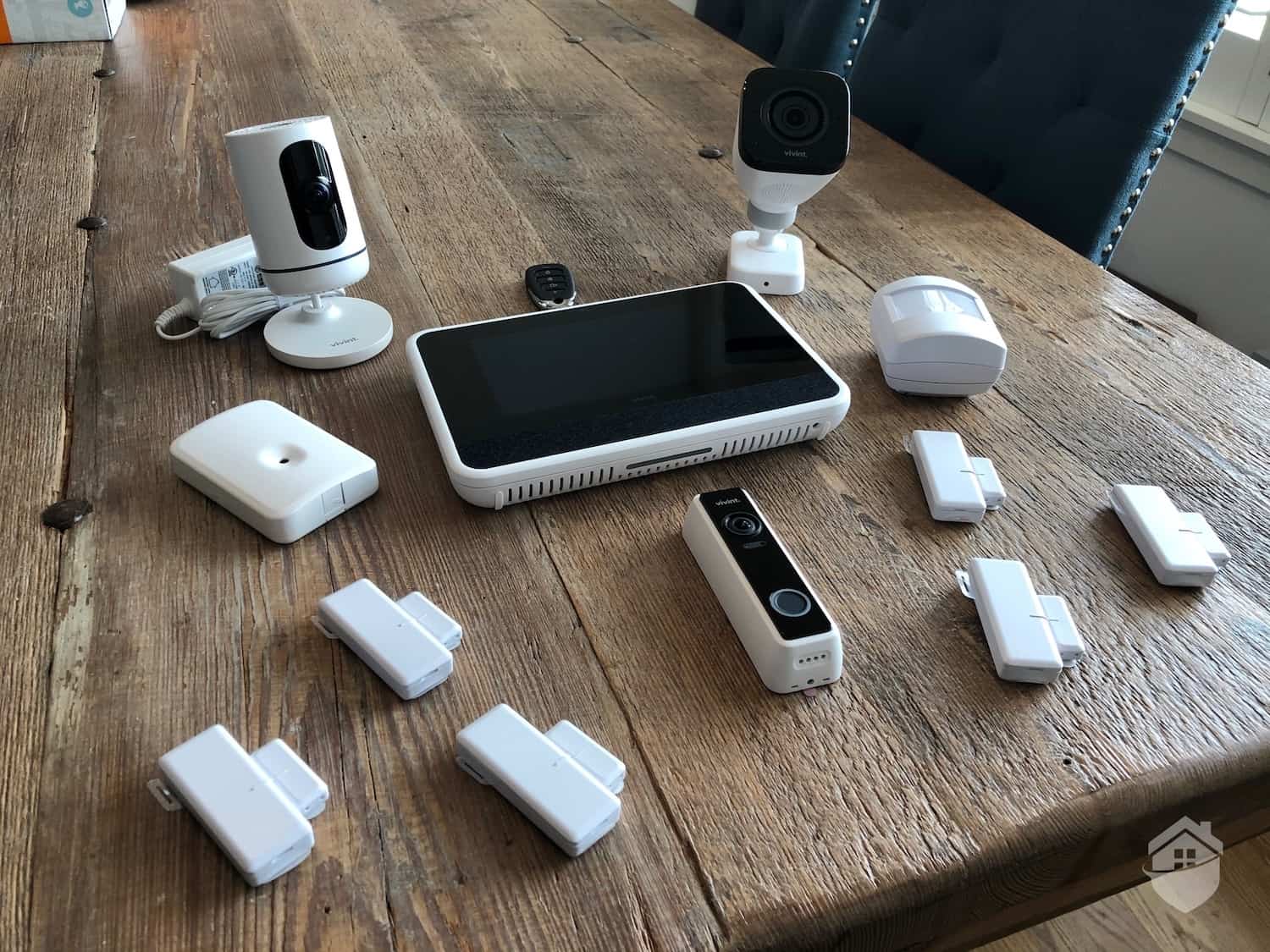With a home security system, you can be safe in the knowledge that someone is always watching over your property. Right? Well, not necessarily.
Professionally monitored systems watch over your property. Unmonitored systems — or, more accurately, self-monitored systems — help you watch over your property.
The self-monitored SimpliSafe plan will notify you if someone breaks into your home. The company’s professionally monitored plan will notify both you and the police.
I’ve tested the best monitored systems, the simplest unmonitored systems, and everything in between. The biggest lesson I learned: There’s no one-size-fits-all solution. Here’s everything you need to know to choose a home security system that fits you.
How Professionally Monitored Security Systems Work
Professionally monitored security systems are, well, monitored by professionals. If your alarm goes off, agents at a monitoring center will check it out and call emergency services if needed. But what happens between your sensor detecting motion and the police showing up at your door?
1. Your Security System Detects a Threat
One of your devices has sensed that something is wrong: A motion sensor detected movement in the nursery, or the back door alarm sensor went off. Maybe a smart home security camera spotted a lurker by the garage.
If your security system is armed and online, it will send an urgent message to you and a monitoring center.
>> Read More: Does Your Home Security System Still Work in a Power Outage?
2. Security Professionals Assess the Threat
What happens next depends on your security system. If you have a Deep Sentinel plan, a real, live guard will actually review your security camera footage. They’ll check whether it’s a false alarm or a true threat.
If they spot a prowler, they’ll use the two-way microphone to tell them to scram. (We got to witness that firsthand; check out our Deep Sentinel review.)
Did You Know? Between 94 and 99 percent of the time police respond to a monitored system, it’s a false alarm.1
Not all professional monitoring centers are that thorough. A $20-a-month Ring Alarm plan won’t get you live guards. It will get you a phone call. When the alarm goes off, Ring’s professional monitors will contact you to ask if everything is OK.
How long will you have to wait between the alert and the call? The best security system response time we’ve encountered in our tests is 20 seconds.
| System | Seconds |
|---|---|
| Alder | 30 |
| Frontpoint | 25 |
| SimpliSafe | 20 |
| Vivint | 35 |
FYI: Do you live in a jurisdiction that requires “verified response”? Your local emergency services won’t respond to an alarm that hasn’t been, you know, verified. An alarm monitor must speak with you or view your video footage before calling the police.
3. Security Professionals Contact Emergency Services
Alarm monitors have received the alert, checked on your property, and discovered that there really is a threat. Now they’ll do what they’re paid to do: Contact emergency services.
This isn’t your grandma’s 911 call. Staff at professional monitoring centers can send your data to emergency dispatch electronically. According to ADT, it can be eight times faster than a phone call.2
How long will it take for the police to show up at your door? That depends on the police department. In November 2023, it took the NYPD an average of about nine and a half minutes to respond to a critical incident.3
How Unmonitored Security Systems Work
Does that mean your basic Wyze home security package is worthless? No. I’ve spent hundreds of hours testing unmonitored security systems, and I’ve always felt safer with one than without one.
Unmonitored security systems are also called self-monitored systems for a reason. You have to monitor the system. The thing is, you can do a pretty good job. Here’s how.
1. Your Security System Detects a Threat
Let’s say you’ve installed a plug-and-play Ring Alarm package sans the $20-a-month Ring Protect Pro Plan. Your camera is up and running, your sensor placement is on point, and your hub is online. The only thing missing is professional monitoring.
>> Read More: How to Effectively Place Security Sensors in Your Home
When a sensor detects something wrong, your security system will ring the literal and figurative alarm bells. It will set off your siren, it will send you a notification — it just won’t alert the professionals.
2. You Assess the Threat
It’s up to you to sort false alarms from real ones. Did an entry sensor fall off the door frame? Did the dog set off your motion detector? Or did your security camera capture an actual intruder? Use your eyes, ears, and app to find out.
Pro Tip: Don’t risk your life playing detective. If you think someone with bad intentions may have entered your home, get to safety. Read more in our guide: How to Survive a Home Invasion.
3. You Call Emergency Services
If there is a true emergency, it’s time to call 911. Stay calm, explain the situation, and don’t hang up.
Pros and Cons of a Monitored Security System
You can add professional monitoring to virtually any security system, but whether you should depends on how much you love the perks and hate the drawbacks.
Pro: 24/7/365 Monitoring
The advantage of professional monitoring is obvious: Someone is always watching over your home.
You sleep. You eat out. You take vacations. None of those activities are particularly conducive to checking your home security app. With a monitored security system, you can let someone else take over for extra peace of mind.
Con: Higher Cost
The biggest disadvantage of professional monitoring is equally obvious: It costs more. That Abode system costs about $200. Do you want to spend another $200 on a year’s worth of monitoring?
Pro: More Perks
The monthly monitoring fee almost always comes with other perks. When you pay $24.99 for an Arlo home security plan, you don’t just get 24/7 monitoring. You get cellular backup, cloud storage, and crash detection too.
Con: Privacy Concerns
You installed a security system to scare off peeping Toms, not invite them inside. A monitored system, however, can give security company employees access to footage of your home.
Did You Know? This year, Amazon was ordered to pay $30 million in fines due to privacy violations.4 One of those violations: A Ring employee viewed dozens of private security camera feeds.
Most security providers have strict policies to prevent misuse of your cameras. You still may want to go with a self-monitored system, though, if you’re concerned about privacy.
3 Questions to Ask Before You Choose a Professionally Monitored System
Not all monitored home security systems are created equal. A top-of-the-line Deep Sentinel system is not the same as a bargain-bin Eufy system. Before you spring for professional monitoring, make sure you understand the difference.
1. How Much Will It Cost?
Ah, the million-dollar question (well, hopefully not quite that much): How much will you have to pay for professional monitoring?
That can be a surprisingly difficult question to answer. You can’t get a straight answer about Vivint pricing until you’re about to sign on the dotted line. Expect to pay at least $40 per month for monitoring.
Newcomers to the security sector tend to be more transparent. Ring charges $20 per month for professional monitoring, while Arlo charges $24.99.
Professional Monitoring Cost per Month
| Abode | $22.99 |
|---|---|
| Arlo | $24.99 |
| Eufy | $9.99 |
| Ring | $20 |
| Wyze | $9.99 |
2. Who Monitors It?
In an emergency, your home security system will alert a professional monitoring center. But where? Who owns it? Who works there?
If you went with an ADT plan, there’s no big mystery. ADT owns six security operations centers around the United States.5 It’s big and established, so it can handle your alarms in-house.
Smaller providers have to partner with other companies. Wyze routes your emergency alerts to Noonlight, a third-party monitoring service. If our Wyze review is anything to go by, Noonlight is doing a good job.
If you’re considering a home security system that contracts out its monitoring, you should research the monitoring company too.
3. Is There a Money-Back Guarantee?
Not even the best home security system can prevent a break-in for certain. If a burglar is determined to smash and grab, they will. So what happens then?
ADT pays up to $500 of your home insurance deductible. Ring will replace your stolen doorbell camera6, but nothing else.
FYI: Have you decided to go for 24/7 monitoring? You may need a license for that. Check if you live in a jurisdiction that requires a permit for a monitored alarm system.
The Takeaway
Professional monitoring is reassuring, but pricey. Can you get away with an unmonitored system?
It’s up to you. If you value privacy, affordability, and flexibility, a self-monitored system could be a great choice. If you don’t mind paying an extra $20 a month for peace of mind, however, you should go with a monitored system.








